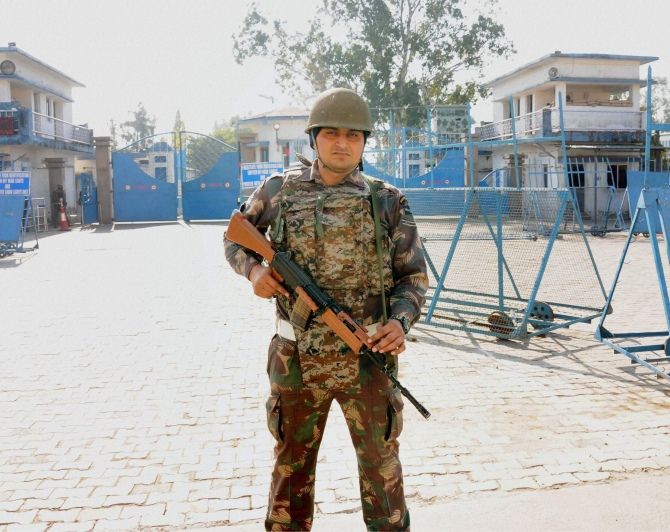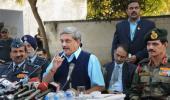
The National Investigation Agency on Tuesday said there is "little doubt" that the terrorists who attacked the Indian Air Force base at Pathankot were from Pakistan and it will be seeking voice sample of the mother of one of the gunmen who had spoken to her hours before the strike.
The anti-terror probe agency's chief Sharad Kumar said help of Pakistan will be sought in solving the Pathankot terror attack case in which seven security personnel were killed. Six terrorists were eliminated during the encounter with the security forces.
Kumar, who will be flying tomorrow to the IAF base at Pathankot for an on-the-spot assessment, said the NIA will be seeking voice sample of the woman whose son was part of the terror group. The gunman is reported to have told his mother that he is going on a suicide mission and that he will be a martyr.
Asked about the nationality of the terrorists involved in Pathankot attack, Kumar said there is "little doubt" that the attackers were from Pakistan, adding "whatever evidence that is available in front of us till now is based on intercepted telephone calls between the terrorists and their handlers and family members across the border".
He, however, refrained from naming the terror group responsible for the attack, saying "Let us work first. We will be able to establish everything once we have some evidence to support our claims. The case has to be proved before the court of law and therefore I will refrain from making statements on speculation."
The terrorists were believed to owe allegiance to Pakistan-based Jaish-e-Mohammed.
Kumar said the probe was at an initial stage and refused to confirm if Pakistan's external spy agency Inter-Services Intelligence had a role to play in the incident. "I can't say whether the ISI is involved or not. Let us see what happens after our probe is completed," he said.
The NIA chief also said the agency would try to identify the slain terrorists and may seek Pakistan's help in getting the voice samples of those from across the border whose voices figured in intercepted conversations.
"We will ask them (Pakistan) to give us the voice samples once we identify these people," he said. The terrorists had made several calls from the local mobile phone of a jeweller Rajesh Verma to places in Pakistan including Bahawalpur where they spoke to their handlers as well as family members, official sources said.
The NIA chief said Central Forensic Science Laboratory team was already assisting the 20-member agency team that is camping in Pathankot after the news of terror strike broke in the morning of January two.
"We will also collect the DNA samples from all the dead bodies of the terrorists which may come in handy in future," he said.
The NIA had on Monday registered three cases in connection with the brazen terror strike, including the murder of a taxi driver by suspected terrorists, kidnapping of a superintendent of police rank officer and attack on the IAF base on the intervening night of January one and two.
Kumar said solving the conspiracy behind the attack is a "very big challenge" but recalled how the agency had in the past established the identity of culprits in many blind cases.
"It's a very challenging case and a lot of investigation needs to be done. Therefore, I am not fixing any deadline to the case but we will try to complete the probe soon," Kumar said.
Image: A security forces jawan guards at the Pathankot Air Force base after the end of the military operation against militants. Photograph: PTI










